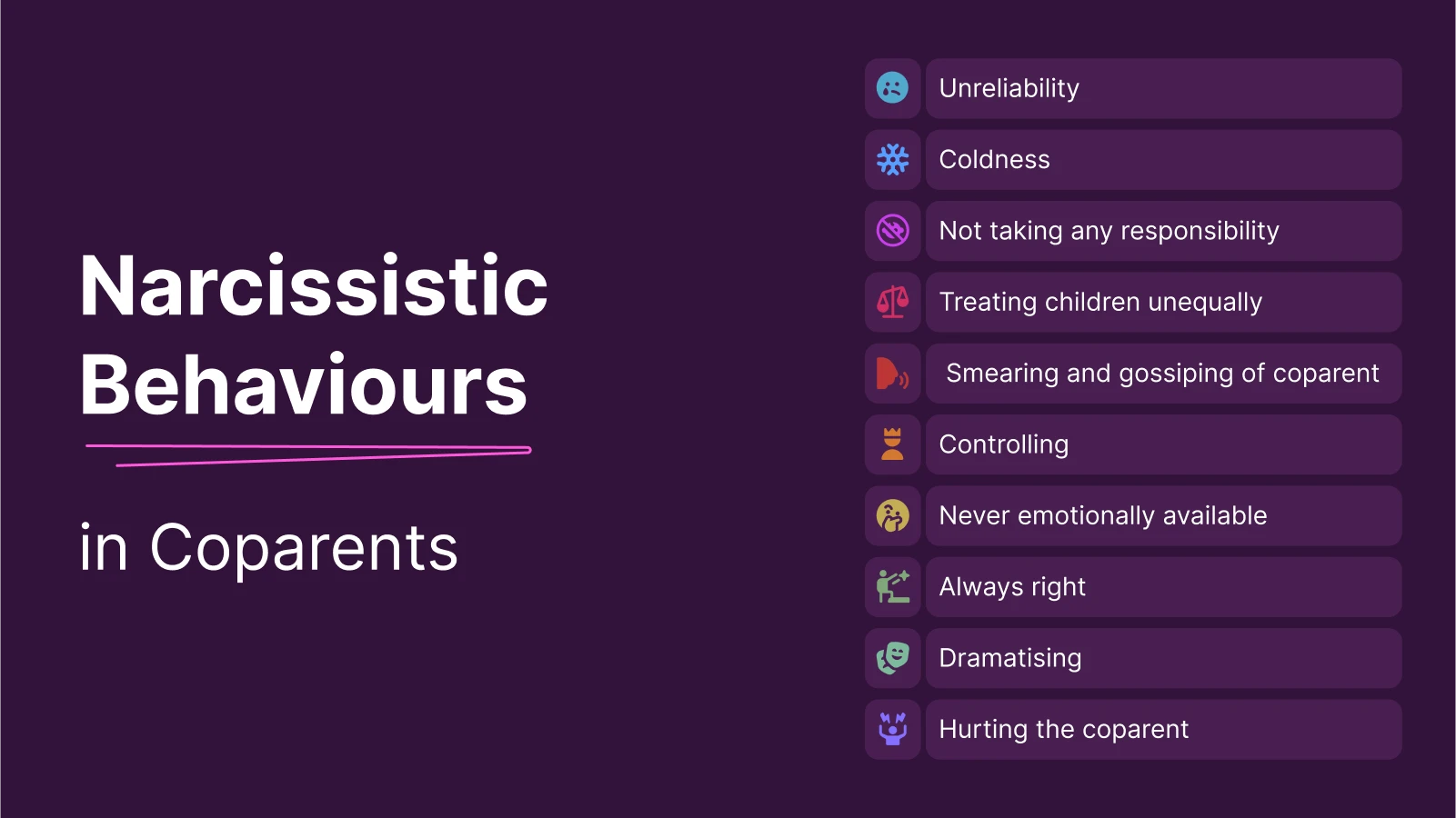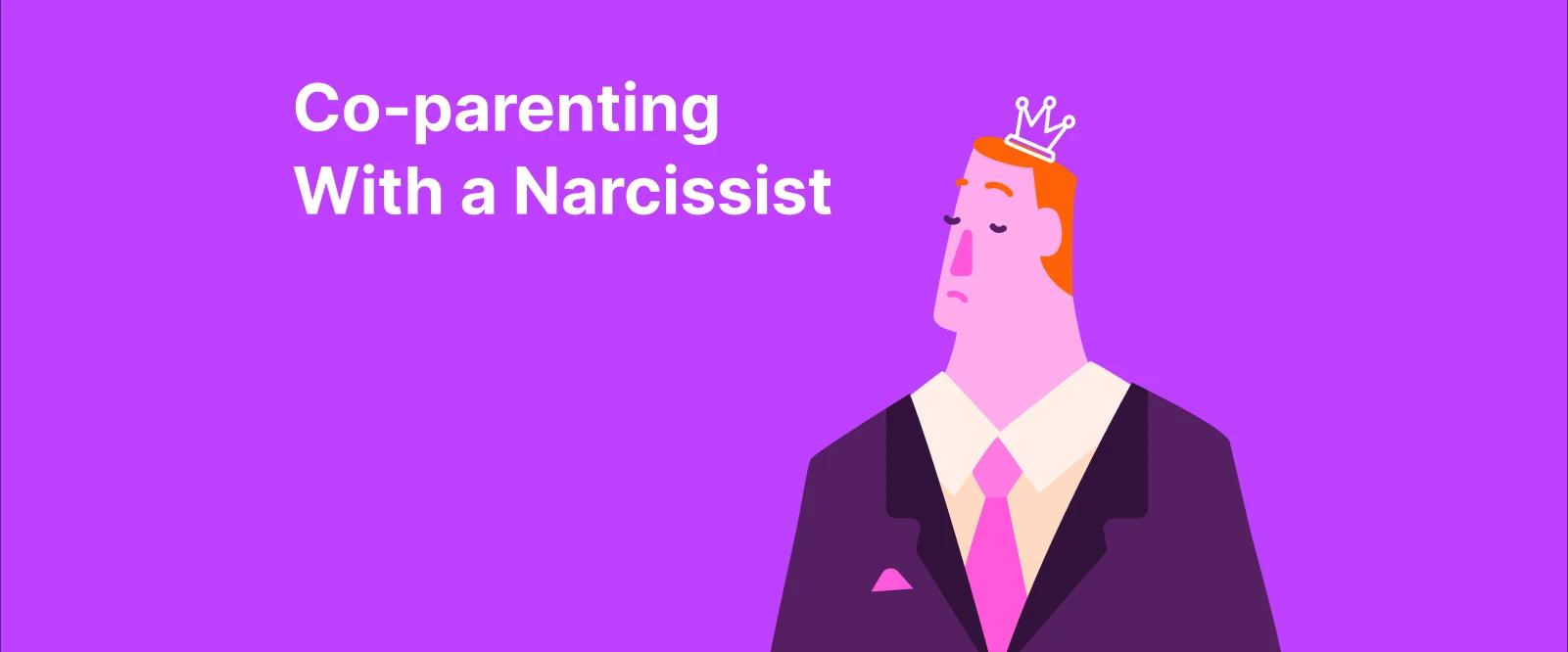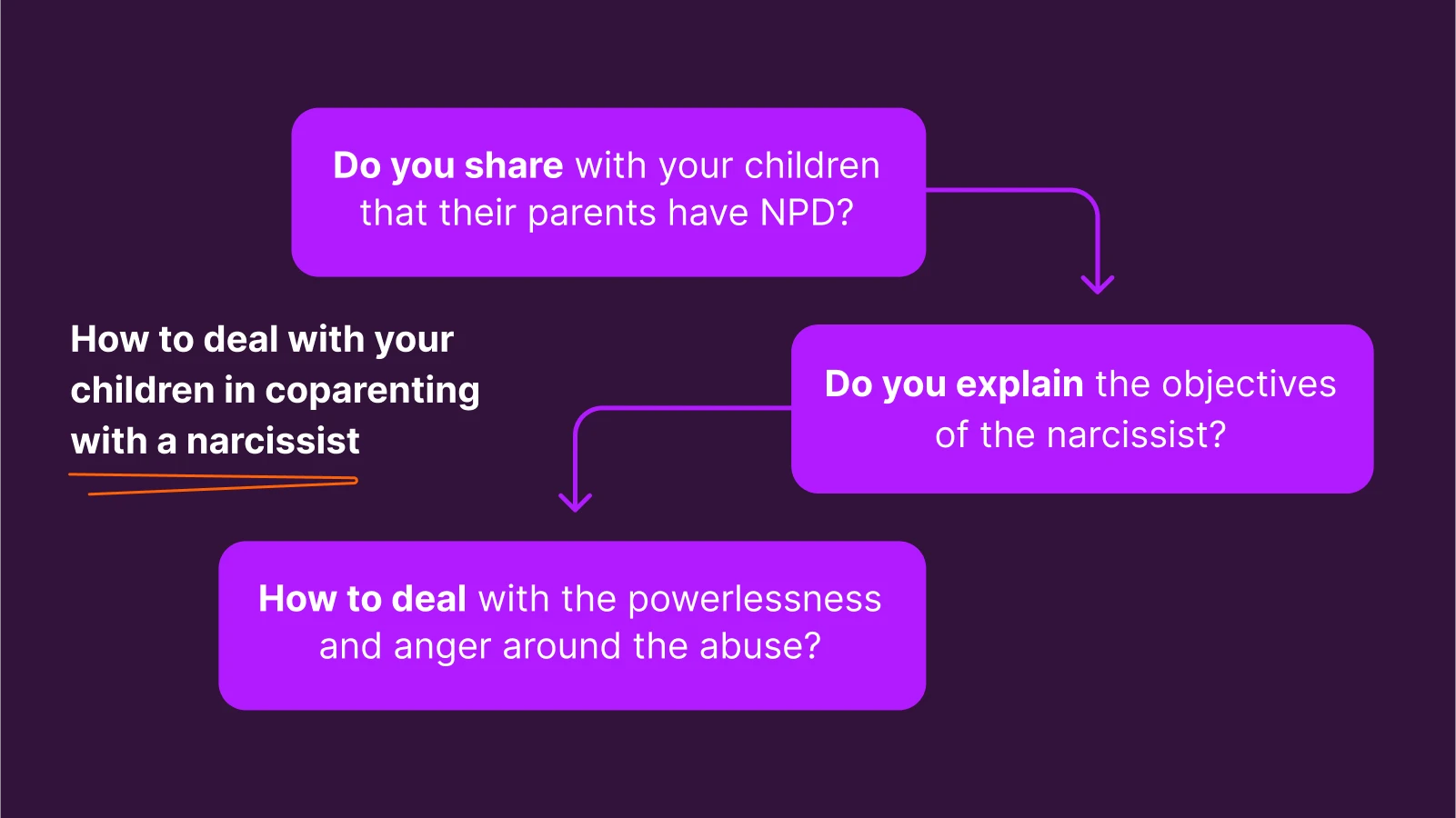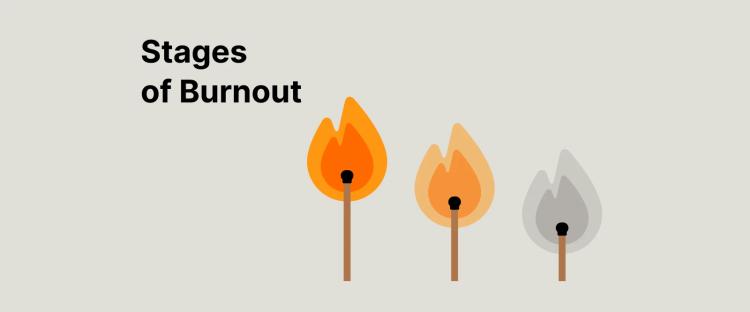You're in a high-conflict co-parenting relationship with someone who turns every drop off into a power play, every school event into a performance, and every parenting decision into a custody battle. You try to be reasonable. You try to focus on your child's needs. But it feels like you're the only one following the parenting agreement — because you are. Put simply, coparenting with a narcissist is hard.
If you've ever felt like you're going crazy trying to make coparenting work with a narcissistic ex, you're not alone. And more importantly, you're not imagining it. The dynamics you're experiencing after your high-conflict divorce are real, documented, and — with the right parallel parenting strategies — manageable. That's why I wrote this article.
Want to understand narcissistic behavior on a deeper level?
Download the Headway app for 15-minute summaries of expert psychology books on narcissism, boundaries, and mental health recovery after emotional abuse. Knowledge is always your best defense.
Quick answer: How to coparent with a narcissist?
Shift to parallel parenting: Accept that a healthy co-parenting relationship is impossible. Instead, minimize contact and operate independently.
Document everything: Keep records of all communications, including any broken court orders, and information regarding the parents' behavior for submission to the family court.
Set firm boundaries in your parenting plan: Establish consequences that protect your child's life and follow custody arrangements.
Minimize in-person contact: Use coparenting apps for drop-off schedules, and avoid face-to-face confrontations with your narc ex.
Protect information: Share only what's required by the custody agreement; anything else becomes ammunition.
Focus on your child's needs, not the narc: Offer your children consistency, validation, and support for their self-esteem and mental health.
Watch for parental alienation: Document attempts to turn children against you; covert narcissists are especially skilled at this.
Stop trying to rescue them: Let your narcissistic partner face the natural consequences of their behavior.
Plan for their unreliability: Always have backup arrangements for parenting time and custody arrangements.
Seek specialized support: Work with family law attorneys and therapists who understand narcissistic traits and high-conflict situations.
What makes coparenting with a narcissist impossible?
Coparenting is described by Oxford Languages as "Sharing the duties of bringing up a child (used especially by parents who are separated or not in a relationship)."
In healthy coparenting, the aim is to offer situations and solutions that benefit the child, giving them the least possible disruption and the highest possible sense of safety.
Unfortunately, coparenting with a narcissist will never focus on sharing or decisions that benefit the child. From the perspective of the narcissist, children are a tool to get narcissistic supply and often a way to punish their ex-partner.
What a narcissist aspires to in a relationship is winning, control, manipulation, being the centre of attention, and being the most important person. There's no natural warmth, empathy, kindness, or balance.
Considering these characteristics, it's clear that co-parenting is an impossible proposition.
📘 Need strategies to protect your kids? Get Headway for narcissistic abuse recovery wisdom!
Values that inform choices and behaviour in a narcissistic coparent
As values are the foundation of the next steps, always remember that a narcissist is like a person with an addiction, with two desires that inform all their plans. The first is narcissistic supply (the need for attention, admiration, and confirmation that they are the best), and the necessity to hide their egos, to protect themselves from being exposed as insecure or "less."
The moral compass of narcissists is very different from that of 'regular' people, so it is essential to remind yourself that they don't share the same values.
To explain, the values below are typical for someone who suffers from Narcissistic Personality Disorder and will inform the behaviour of the Narcissistic CoParent (NCP).
1. Image and appearance
For a narcissist, it’s vital to come across as attractive, well-connected, wealthy, intelligent, and prosperous, and a narcissist will sacrifice values such as financial safety, love, and honesty for this aim. This gives them confidence, and at the same time, it’s a way to mask their lack of it.
Additionally, there is a lack of boundaries between child and parent, as the child is considered an extension or a representation of what the NCP aspires to. In coparenting, the NCP often has opportunities to control their child, as there are more situations where they are not supervised or interrupted by the other parent.
2. Disrespect
They recognize only their own needs and treat everything else as irrelevant. To satisfy those needs, they disregard others completely — dismissing different viewpoints (they can't or won't see beyond their own), violating boundaries (their entitlement overrides any limits), and devaluing even children (no one matters except themselves). NCPs have no qualms putting down their own children, forcing them into actions they don't want (sports, music, clothes), and disregarding their wishes.
3. Dishonesty
For a narcissist, the truth exists only when it serves their purpose. Objective facts hold no value. They shape reality to fit a version that protects their needs, including lying, distorting, and reframing events without perceiving it as deceit. To them, it's self-preservation. Even clear evidence won't make them admit the truth. In co-parenting, this shows up as broken promises, confusing the child, and avoiding accountability.
4. Self-centeredness
They see themselves as the axis around which everything spins, expecting everyone else to align with their world. Every event or story ultimately circles back to them. Their behavior aims to maintain, or even impose, that central role. They'll bring their child to a game they personally enjoy, pick meals that suit their taste, and claim their child's success as their own.
📘 Need to understand and protect yourself? Download Headway for narcissistic personality insights from therapists!
5. Disloyalty
According to a narcissist, people can't be trusted, people are there to be used, and if they don't fulfill their purpose anymore, it’s time to find someone else who can replace them. There’s no recognition of the worth of shared experiences. A narcissistic parent loves what the child can do for them, but when that stops, the affection stops as well.
6. Control
Maintaining control is vital for a narcissist. They must manage themselves to protect their fragile ego and dominate others to secure the attention and validation they crave. That "supply" doesn't have to come willingly — it can be coerced. The method doesn't matter, only the outcome. One of their favorite tactics is triangulation, which involves creating distance between people by speaking for them: "Your sister said…" or "Everyone thinks you're…". They also use money, promises, and gifts as tools to maintain power and influence.
7. Self-importance
The narcissist is the center of the universe and their whole life and that of others is organized, controlled, and bullied around their importance. The lack of empathy, let alone compassion, makes it impossible for them to connect to the emotions and upset of others. This makes it easier to focus on themselves and make sure that their needs are met. For instance, spoiling a child's birthday party by creating drama about themselves is a common practice.
Narcissistic behaviors in coparents
Considering the main values, it is clear that a narcissist won't win a prize for responsible and loving parenting. However, if two parents live together, and one of them is a narcissist, the other can correct, explain, or compensate for the narcissist, reducing some of the confusion and hurt in their children.
Yet, when coparenting with a narcissist, there will be more situations where your children are fully exposed to the narcissistic abuse, without anyone to rescue or protect them.
As noted earlier, co-parenting with a narcissistic coparent revolves around fulfilling their needs and often serves as a means to punish the other parent. This can manifest through unreliability, emotional withdrawal, refusal to take responsibility, unequal or unfair treatment of the children, smear tactics, control, and manipulation.
 Unreliability: Regardless of what has been said or promised, the NCP will do whatever they want. For instance, when it comes to pick up times, they will be late, or early in order to disrupt, or never turn up. They might withhold payments, not enroll children for courses, or stick to any other agreement.
Unreliability: Regardless of what has been said or promised, the NCP will do whatever they want. For instance, when it comes to pick up times, they will be late, or early in order to disrupt, or never turn up. They might withhold payments, not enroll children for courses, or stick to any other agreement.
Coldness: The NCP won't offer emotional support to either the coparent or the child. The only emotions they are familiar with are anger, hate, and jealousy.
Not taking any responsibility: Whatever is going on or going wrong, it will never be the fault of the NCP. Forgetting the gym kit for the youngest is the fault of the child or the coparent who didn't remind them, or the older sibling who should have known….
Treating children unequally: An NCP will decide on a favourite (the golden child), a scapegoat (always doing it wrong), and an invisible child (completely ignored). Sometimes they swap roles. One way this manifests is via unequal Christmas presents: The golden child will get an Apple Mac, the scapegoat will receive a book, and the invisible one won't get anything. Because of this, it's difficult for siblings to build a healthy bond, as there's constant competition between them.
Smearing and gossiping of the coparent: Where a healthy coparent will carefully protect the reputation of the other parent, an NCP happily communicates the 'dirt' about their ex-partner. Of course, this is often just a made-up story.
📘 Feeling overwhelmed? Get Headway for survival strategies from abuse recovery experts!
Controlling: The opinion of the child is never of interest to the NCP. To a narcissist, their child is there to enhance their image. They will force the child to play a sport that they can show off with or play an instrument that the NCP chooses.
Never emotionally available: An NCP is not able to offer emotional support. Instead of picking their child up after they've fallen, giving them a hug and kissing their knee better, they will groan, telling them to 'get on with it,' or that they're overreacting.
Always right: It's impossible to have a discussion with an NCP and disagree. This always leads to very strong reactions and heavy arguments. When children reach their teenage years and start to become more assertive, their NCP won't accept it and will instead shut them down.
Dramatising: Any behaviour from a child or coparent that the NCP doesn't like will get blown out of proportion and become a huge problem. It’s how they try to control behaviours and situations.
Hurting the coparent: There are many examples of situations where the NCP manipulates a child to hurt the coparent, such as taking them away for a weekend during a birthday, or buying them expensive presents but not paying maintenance.
Strategies for effective co-parenting
We've talked about what it's like to coparent with a narcissist. So, how can you make it easier?
First, coparents need to step away from the expectation and illusion that both parents are aiming for the same objective. As we've explored, the NCP doesn't really care about their children or the well-being of their coparent. Everything is happening around the needs of the NCP. Because of that, it makes sense to rephrase 'co-parenting' into counter-parenting.
From the point of view of counter-parenting, the following strategies are useful:
Consider yourself the only parent that can be relied on. As the NCP can't be trusted, it's less stressful to use this approach. Have backup plans for arrangements, so you're not dependent on the NCP. If they stick to the agreement, it's a bonus.
Learn more about Narcissistic Personality Disorder to anticipate your NCP's next move or reaction.
Never trust what the NCP is saying, unless there's proof it's true. They will make up stories about the children, what they said and did, stories about you as the coparent, add drama, present things out of proportion, and try to upset relationships within the family.
Set boundaries around timings, activities, and identify repercussions that are truly painful for the NCP. It's the only way to get some control back, as it's highly likely that the NCP will ignore any boundaries you set.
Be careful with the information you share, as anything that can be used against you or the children is fair game, both now and in the future.
Play along with their game. To withstand their manipulation, you'll sometimes need to manipulate and lie in return. It's not easy, but it's often the only way to cope.
Keep communication clean and factual. Use co-parenting apps for communication or involve a third party. If possible, avoid as much personal contact as possible. Could you use a mediator? Can you allow only email or text? Is it possible to set times for exchanges instead of random messages? Every moment of contact will re-ignite the trauma and emotions.
Document all events and interactions. This will help you to protect yourself from gaslighting, and you'll be prepared if there's a court hearing at any point.
Remember that this situation will pass. Children grow up, and it will reach a point when your NCP can't play their disruptive role anymore.
📘 Need more protection tactics? Try Headway for boundary-setting wisdom from trauma therapists!
The impact on children
Children with a narcissistic parent often develop an insecure attachment style. An anxious attachment results in an extreme need for external validation, low confidence, fear of abandonment, being 'not enough' or 'not good enough,' and strong people-pleasing behaviour.
Additionally, an avoidant attachment presents itself in independence and self-sufficiency, fear of being vulnerable, and avoidance of emotional closeness.
A third attachment style, disorganised attachment, is a mixture of the anxious and avoidant, and is characterised by fear of intimacy and abandonment, including push and pull behaviour.
These attachment styles will impact the child's ability to develop healthy relationships in later life. Overall, children with an emotionally abusive parent also develop certain behaviours, which are explained in this article.
How to deal with your children in coparenting with a narcissist
Your children will be confused, unsure what is right, who to believe, and might feel unsafe. As the healthy coparents, you can offer them a solid base, where they can process the events in their lives and grow.
You can't shield your children entirely from a narcissist's influence, but you can be their steady anchor — someone they can always trust and rely on. Stay consistent and model respect, love, and dependability. Through your actions, they'll learn what a healthy parent truly looks like, in contrast to the narcissistic one. Your unconditional love and acceptance will help heal their emotional wounds.
It's very tempting to try and rescue the NCP. For example, when they don't stick to the deal of taking your child to a training session, it's easy to step in for the sake of your child and take them instead. However, by doing that, your child won't see the true colours of their NCP. These situations are very trying: Do you allow your child to pay the price by not being able to attend training? Choose your battles carefully.
Take responsibility for what you can do and be clear about the NCP's responsibilities. Also, remember to communicate this to your children. Slowly, they will start to recognise who sticks to their word and who doesn't.
Remember that it's hard for your children. They will be very confused and unsettled. Be gentle and stay focused on having a trusting relationship with them by validating their reality, pointing out the gaslighting and manipulation.
Show by example. Set boundaries, communicate honestly and openly, validate emotions, and offer the safety they need.
📘 Want to be the parent they need? Start Headway for resilience-building strategies from family experts!
Vicky, who went through coparenting with an NCP, faced many dilemmas: Do you share with your children that their parent has NPD? Do you explain the objectives of the narcissist? How can you deal with the powerlessness and anger around the abuse?
Her conclusion and tips about coparenting with a narcissist include:
Co-parenting with a narcissist is focused on damage limitation, firefighting, covering up for the unloving actions, and compensating for the shortcomings and promises.
Never smear the narcissist and trust that your children, over time, will see what is happening and has happened.
Focus on the relationship with your children and don't allow your ex to be part of that.
Where can you seek support?
A narcissist doesn't need support, as there is never anything wrong with them in their eyes. However, the coparent and children can benefit from support from the right coach or therapist. Of course, it can only be someone who fully understands the way narcissists operate and the impact of narcissistic abuse.
Children are only ready for therapy once they are older, understand more about narcissism, and see that their parent has NPD. It's important to tread carefully as they have to face a number of difficult feelings and decisions, which require a more mature brain.
Additionally, therapy to work on the relationship between the coparent and the child might be helpful in certain situations.
Finally, when there is strong trauma, EMDR might be the way forward.
There are several support groups online. Check out which ones suit you and then join.
📘 Starting your healing journey? Get Headway for recovery guidance from therapists who get it!
Quick and important pointers in the healing process of the coparent and child:
Ideally, go No Contact. Any moment of contact will re-ignite the trauma.
Understand how much and in what way you have been affected by their behaviour. Go into minute detail. Ideally, do this with a therapist or make a start with this self-help book.
Remember that there is NO HOPE. Narcissists don't change. Don't entertain the thought that things might get better. They won't.
Don't give energy to your narcissist by thinking about them or situations from the past. A good way to 'get rid' of it all is through journaling.
Don't make the narcissist a regular topic of discussion in your family. Every time they pop up, they take over. They've done that for long enough.
Each individual should focus on their own healing process, including finding people who support and validate the right group, treatment, or coach for them.
Narcissistic abuse is very damaging, but it's possible to heal the wounds and emerge as your beautiful self.
Protect your mental health and keep learning with Headway
Coparenting with a narcissist is a 'contradiction in terminus,' and the word 'counterparenting' reflects reality. Successfully navigating coparenting with a narcissist requires the expectation to 'do it alone.' Ultimately, this approach avoids disappointments and drama.
Remember, confusion and chaos will be a part of your life as long as the NCP is involved, and it’s not possible to protect your children from their abuse. Your role is to show what healthy and loving parenting looks like and, in doing so, limit the damage and build a healthy relationship with your children. This topic is multifaceted and complex, and that's why there are numerous links to other sources of information.
Your journey doesn't end here — it evolves. Navigating a high-conflict co-parenting relationship with a narcissistic ex requires constant learning, adaptation, and reinforcement of healthy boundaries.
The Headway app gives you access to hundreds of expert-written summaries on narcissistic personality disorder, parallel parenting strategies, protecting your child's mental health, rebuilding your self-esteem, and healing from narcissistic abuse — all in 15-minute formats that fit into your busiest days.
Each summary is designed to give you practical tools you can use immediately in your co-parenting relationship — because you deserve support that actually understands what you're going through.
Download Headway today and transform your screen time into healing time.
Frequently asked questions about co-parenting with a narcissist
What is the best custody arrangement with a narcissist?
Parallel parenting with a highly detailed parenting plan is your best option. This means minimal contact, communication only through email or coparenting apps, specific drop-off times and locations in the custody agreement, and each parent making day-to-day decisions during their parenting time.
How should you respond to a narcissist when co-parenting?
Use the Gray Rock Method: Keep responses brief, factual, and emotionally flat. Communicate only about your child's needs through email or apps — never in person if possible. Example: "Pickup is 3 PM Friday" instead of explanations. Document everything. Don't engage with personal attacks or drama — just stick to the parenting agreement.
How can you coparent with a toxic ex?
Accept you're counter-parenting, not coparenting. Set firm boundaries in your parenting plan, use written communication only, document violations of court orders, and focus on being a stable parent during your parenting time. Protect your mental health with therapy. Let go of trying to change them — control only what you can.
Can a parent lose custody for being a narcissist?
Rarely based on narcissism alone — family court requires proof of a harmful parent's behavior, not just a personality disorder diagnosis. However, document patterns of parental alienation, violating custody arrangements, neglect, or abuse. Remember, courts care about your child's needs and safety. Work with a family law attorney experienced in high-conflict custody battles to present evidence effectively.
How can you protect a child from a narcissistic parent?
You can't control their parenting time, but you can be an emotionally available, stable parent when your child's with you. Validate their feelings without badmouthing the narc. Sign your child up for therapy with someone trained in high-conflict family dynamics, and document concerning behaviors. Build their self-esteem and mental health through unconditional love and consistency.
What is the Gray Rock Method?
Gray Rock means becoming as boring and unresponsive as a gray rock — giving no emotional reactions that narcissists crave. Keep responses brief and factual in your co-parenting relationship. Use a monotone voice, avoid eye contact in person, and stick to essential topics only. This method works best through written communication in high-conflict situations. Use the method to protect your mental health by cutting off their narcissistic supply.













